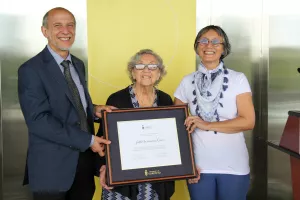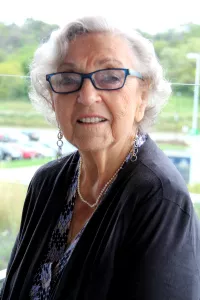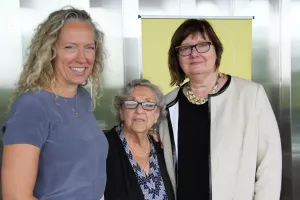
UTM honours Holocaust educator Judith Weissenberg Cohen
The life’s work of Holocaust survivor and educator Judith Weissenberg Cohen was honoured on Wednesday, July 26 at a reception at U of T Mississauga. Professor Ulrich Krull, Vice-President and Principal, UTM, and Professor Amrita Daniere, Vice-Principal, Academic and Dean, presented Weissenberg Cohen with a Principal’s Appreciation Award to recognize her ongoing commitment to anti-racism, Holocaust remembrance and education.

Raised in Hungary, Cohen was just 15 when her family was imprisoned in Auschwitz-Birkenau. Her parents, four of her siblings and much of her extended family perished in the camp, while Cohen was moved to subsequent camps and performed slave labour in a Nazi aircraft factory. She survived, and was eventually reunited with two surviving siblings, Eva and Leslie, and spent two years in the Bergen-Belsen Displaced Persons Camp before emigrating to Canada in 1948.
She married Sidney Jessel Cohen and eventually settled in Toronto where they raised their children, Michelle and Jonothan. In 1993, an encounter with neo-Nazi Holocaust deniers in downtown Toronto spurred her to become an activist in Holocaust education and anti-racism.
Cohen is noted for founding Women and the Holocaust, one of the first websites to document the stories of women in the Holocaust. “Judith found that the particular experiences of women were not represented in Holocaust history,” Simalchik says. “She uses an intersectional analysis, talking about race, gender, class and sexuality, and how each identity was impacted differently.”
“There was a real taboo in Holocaust studies about differentiation in experiences of gender because there was an idea that to compare would be to belittle,” Wittman says. “But Judy was at the forefront of work, which is now an enormous field unto itself.”

“We are not trying to privilege one suffering over another. We all lived in the 'same hell, but we experienced different horrors,' to paraphrase Professor Myrna Goldenberg's famous dictum," says Cohen. In her lectures, she also discusses more recent genocides and the treatment of women in conflict situations. “I hope that everyone who listened to me learned something. The Holocaust didn’t end it all. Oppression and persecution and abuse of women is still going on.”
“Her presence in the classroom is important,” Wittman says. “There is debate about the value of survivors’ testimony—visceral and emotional testimony isn’t necessarily historically valued,” she says. “Through Judy, I have learned that speaking to survivors can teach so much more than any official document can. She has a profound impact on students. They have so much to learn from her voice and that of other survivors.”
Watch Judith Weissenberg Cohen speak about her experiences during the Holocaust >
